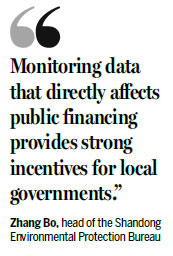Rewards program helps province's air
Updated: 2016-04-23 07:42
By Wang Yanfei And Zhao Ruixue In Jinan(China Daily)
|
|||||||||
Air pollution emissions in Shandong province fell during the first quarter of the year, thanks to a market-based air quality incentive program that could end up being rolled out across the country.
The province's environmental protection bureau said the concentration of four major pollutants - fine particles, inhalable particulate matter, sulfur dioxide and nitrogen dioxide - decreased during the first three months. They fell by 2.2 percent, 3.8 percent, 18.2 percent and 8.2 percent, respectively.
Because of the improvement, 15 municipal governments in the province that performed particularly well will get to share a 39.37 million yuan ($6.09 million) fund. However, local governments in the Shandong cities of Jining and Zaozhuang will have to pay penalties of 4.56 million yuan and 960,000 yuan respectively, because of their deteriorating air quality, the provincial finance bureau said.
"Monitoring data that directly affects public financing provides strong incentives for local governments to improve air quality," said Zhang Bo, head of the provincial environmental protection bureau.
The provincial government in Shandong is among the first to participate in the rewards program, which offers compensation for successes and financial punishments for failures in air pollution control.
The provincial government has invested more than 300 million yuan since 2014 on encouraging its cities to improve their air.
The compensation is essentially offered for lost income because of factories closing or modifying in the pursuit of better quality air.
Wang Zuwu, a professor in the School of Resource and Environmental Sciences at Wuhan University in Hubei province, said other provinces and cities could adopt similar incentive schemes to control air pollution, based on their own sources of pollution and their ability to offer compensation.
However, Wang also pointed out that the quality of air quality monitoring will also need to be improved, otherwise such schemes would be flawed and rewards and punishments could be inappropriate.
Wang also said policy makers should make it clear who must foot the bill for any compensation offered because tax payers should not be left out of pocket.
"The government should strengthen efforts to trace polluters, and entrepreneurs that have invested large sums of money on upgrading pollution control facilities," he said.
Wang added that experiences from pilot regions, such as Shandong, will give the central government the tools it needs to improve the initiative and promote it nationwide.

Today's Top News
Chinese philanthropists explore British way of 'giving'
Back on the up
China leads way on US adoptions
Ericsson reshapes and sees Q1 profit rising
Snowden sues Norway to seek safe travel to get prize
Nation's drones are in demand
Beacons and gun salutes as Queen turns 90
Buckingham Palace seeks royal social media operators
Hot Topics
Lunar probe , China growth forecasts, Emission rules get tougher, China seen through 'colored lens', International board,
Editor's Picks

|

|

|

|

|

|







